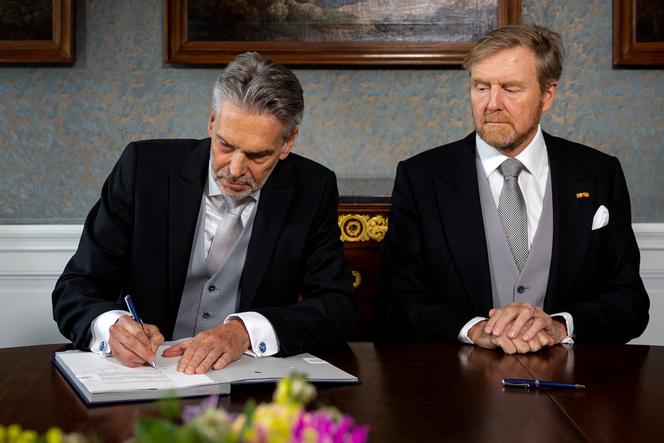
The Netherlands has a different prime minister for the first time in 14 years as Dutch King Willem-Alexander swore in the country’s new government on Tuesday, July 2, more than seven months after elections dominated by a far-right, anti-Islam party.
Dick Schoof, former head of the Dutch intelligence agency and counterterrorism office, signed the official royal decree at Huis Ten Bosch Palace, saying he “declared and promised” to uphold his duties as the country’s prime minister. The 67-year-old was formally installed alongside 15 other ministers who make up the country’s right-leaning coalition.
The anti-immigration party of firebrand Geert Wilders won the largest share of seats in elections last year but it took 223 days to form a government.
The four parties in the coalition are Wilders’ Party for Freedom, outgoing Prime Minister Mark Rutte’s center-right People’s Party for Freedom and Democracy, the populist Farmer Citizen Movement and the centrist New Social Contract party.
The formal agreement creating the new coalition, titled “Hope, courage and pride,” introduces strict measures on asylum-seekers, scraps family reunification for refugees and seeks to reduce the number of international students studying in the country.
Opposition from other coalition partners prevented the controversial Wilders from taking the prime minister’s job. During the monthslong negotiations, he backpedaled on several of his most extreme views, including withdrawing draft legislation that would have banned mosques, Islamic schools and the Quran.
For the first time since World War II, the Netherlands is now led by a prime minister who is not aligned with a political party. Before serving as chief of the country’s top intelligence agency, Schoof was previously the counterterror chief and the head of the country’s Immigration and Naturalization Service.
During the lengthy talks, his name had not been circulated as a possible prime minister and national newspaper the Telegraaf reported that Schoof was the fifth choice for the top spot. Wilders’ first pick, Ronald Plasterk, was forced to withdraw from consideration after allegations of his involvement in a medical patent fraud came to light.
The other government ministers were sworn in Tuesday according to seniority of their departments. One minister, Femke Wiersma who will head the agriculture portfolio, made her declaration in Frisian – the country’s second official language alongside Dutch.
Partner service
Learn French with Gymglish
Thanks to a daily lesson, an original story and a personalized correction, in 15 minutes per day.
Try for free
Although the November elections were widely seen as a win for the far right, political youth organizations are already pushing back on the ambitions of the new government. Ahead of the swearing-in ceremony, youth groups from six parties, including two of the coalition partners, called for a softening on asylum plans.
“Although the influx must be limited, it is of great importance that we receive people here fairly and with dignity,” Eva Brandemann, chairperson of the youth wing of the New Social Contract, told Dutch public broadcaster NOS.
Her counterpart in Rutte’s party, which brought down the government last summer over concerns about the number of family reunifications for refugees, told NOS that problems stemmed from administration, not migration. “The impression after all those conversations is that there is not so much an asylum crisis but a reception crisis,” Mauk Bresser, the chair of the People’s Party for Freedom and Democracy youth organization said.
The new government will now spend the summer firming their coalition agreement into a governing plan.